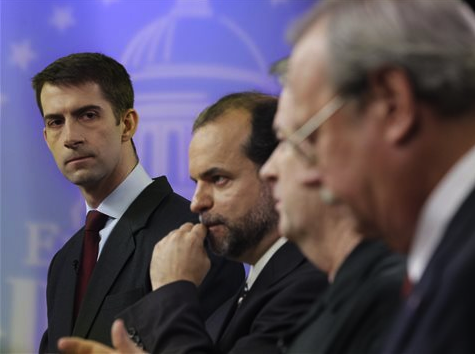My old colleague Charles C. Johnson has published an article in the Daily Caller today attacking Rep. Tom Cotton (R-AR), the freshman Tea Party conservative who is about to announce his challenge to incumbent Sen. Mark Pryor (D-AR). Johnson claims that Cotton, while an undergraduate student at Harvard, “hated libertarians” and “loved Bill Clinton,” highlighting quotes in a handful of Cotton’s columns for the Harvard Crimson. Johnson’s evident aim is to paint Cotton as something other than the true conservative he is.
I actually knew Cotton back then. I was one of the more radical left-wing students on campus, taking classes (yes, plural) with Cornel West, writing earnest political manifestos, and organizing teach-ins. I read Cotton’s columns in the Crimson frequently–he was one of a few conservatives who dared to air their opinions–and I occasionally responded, vehemently. I invited him to represent conservatives in a debate I convened entitled “Apathy or Activism?” Take it from a former opponent: there was no mistaking Cotton’s staunch conservatism.
Johnson hones in on arguments Cotton made against drinking and smoking, and libertarianism in general. He cites these as deviations from conservative philosophy, as if Cotton were arguing against the inviolability of individual rights. In fact, Cotton was arguing from a deep-seated conservatism–one that views education as a means for imposing society’s rules and values on each successive generation, and college as the culmination of that process. That sounds sour to the typical undergraduate–which is why Cotton was brave to assert it.
He did so in column after column. One that stands out in my memory–I didn’t have to search through the online archives, as Johnson apparently did, to discover it–is an article Cotton wrote against the sort of radical activism with which I was involved, and in which students were encouraged by the more popular members of the Harvard faculty. The task of the academy, Cotton argued, was to form responsible citizens, not to unleash their youthful energies against the institutions upon which they relied but did not appreciate.
The article is worth quoting at length:
Walter Rathenau called the great wave of humanity that is each generation “the vertical invasion of the barbarians.” Every 20 years or so, an entire generation arrives on the Earth, uncivil and uneducated. The job of society (that is, of any society that wants to recreate itself) is to tame those barbarians. The task of taming, civilizing and educating the barbarians typically falls (or should fall) to families. Families need help, however, which friends, churches, and schools provide.
The liberal academy has a special role in taming the barbarians. It takes the few outstanding members of each generation and turns them into the men and women who preserve a society’s greatest treasures, the collected wisdom of the ages that defines a society at its most essential level.
At least, the liberal academy should play that role. It seems that this liberal academy has failed to tame the barbarians. In fact, a few vocal Harvard students seem to think that their peers remain regenerate barbarians, resisting the most persistent efforts at (re)education.
As one of the “few vocal Harvard students” against whom Cotton’s arguments were directed, I took offense. There is also nothing quite so grating to a young rebel than to encounter peers who not only take the values of adulthood for granted, but actually advocate for them. Still, I respected Cotton for having the courage to stand up for his deeply unpopular views. (I read, and remembered, because the curious non-conformist in me trumped the radical activist–which is, I suppose, why I eventually came round to the conservative cause).
Johnson also strains to paint Cotton as a supporter of Bill Clinton, and especially Hillary Clinton, for having praised their political skills. To that end, Johnson twists Cotton’s comments about Hillary: he was praising her relative to her husband, not on her own merits. Actually, Cotton’s columns about the Clintons reveal a key trait of his conservatism: he puts principles before party. In one column cited (but not linked) by Johnson, for example, Cotton praised “Clinton’s conservative tendency to get all opinions before he acts.”
Furthermore, Cotton used Clinton’s scandals to articulate classic conservative skepticism of democracy. Johnson snarkily quotes Cotton questioning “the fundamental presumption of democratic self-government, that the people have wisdom and virtue enough to elect politicians wise and virtuous enough to rule.” He leaves out Cotton’s prescient conclusion: “A self-governing people that cannot make the most obvious and rudimentary moral judgments about such matters and its rulers may not be self-governing much longer.”
The essence of conservatism is respect for authority–not just traditional authority (we are Americans, after all), but the authority of timeless principles and the institutions that defend them. That is the kind of true conservative Cotton was at Harvard College, and it is the kind of conservative he remains today, faithful to America’s republican (small “r”) heritage after a journey from Wall Street, to war, to Washington. He wins by being who he is, not who the left wants him to be. He is a leader Republicans–and Americans–need today.

COMMENTS
Please let us know if you're having issues with commenting.